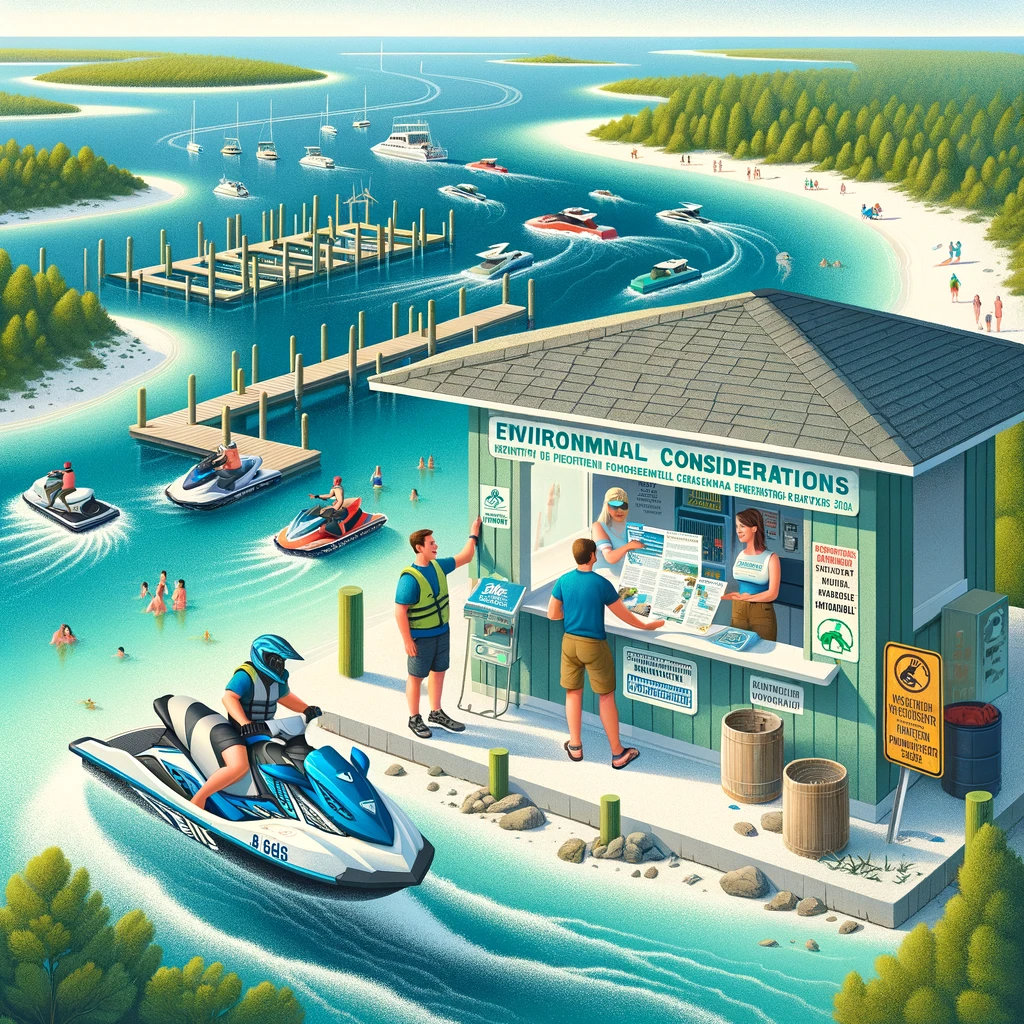Environmental Considerations for Renting Jet Skis

If you’re an avid jet skier seeking a thrilling adventure on the open waters, it’s important to take a moment and consider the environmental impact of your chosen recreational activity. Renting a jet ski can be an exhilarating experience, but it’s crucial to be aware of the potential harm it can cause to the fragile ecosystems that surround us. By making environmentally conscious choices and renting your jet skis from the watersport experts at A2Z Powersport, you not only support ethical business practices, but you also ensure that your adventure is both thrilling and responsible. Located at the picturesque Fort Morgan Marina in Orange Beach, AL, A2Z Powersport is dedicated to providing you with an unforgettable experience while prioritizing the preservation of our fragile marine habitats. Say hello to excitement and goodbye to any concerns of impacting the environment – book your jet ski rental today!
Environmental Considerations for Renting Jet Skis
Jet skiing is a popular water recreational activity enjoyed by many individuals around the world. While riding a jet ski can be an exhilarating experience, it is crucial to consider the potential impact it may have on the environment. By being environmentally responsible, you can ensure the preservation of natural resources, protect wildlife habitats, and promote sustainability in the tourism industry. In this article, we will explore the effects of jet skiing on the environment, highlight the importance of environmental responsibility, discuss regulations and guidelines, delve into eco-friendly jet skiing practices, and provide recommendations for choosing an environmentally conscious rental provider.
Effects of Jet Skiing on the Environment
Noise Pollution
One of the primary environmental concerns associated with jet skiing is noise pollution. The engines of jet skis produce loud and disruptive sounds that can disturb marine life such as fish, dolphins, and other aquatic organisms. Excessive noise can disrupt their communication, affect their behavior, and even lead to hearing damage. To minimize noise pollution, it is important to choose quieter jet ski models and avoid revving the engine unnecessarily.
Water Pollution
Jet skis pose a risk of water pollution through fuel and oil leakage. These substances can be toxic to aquatic ecosystems, harming the flora and fauna residing in the water. Additionally, improper disposal of waste materials, such as trash or chemicals, can contaminate the water and degrade water quality. It is crucial to properly maintain your jet ski, regularly inspect for leaks, and responsibly dispose of any waste generated during your ride.
Habitat Disturbance
Jet skis can cause habitat disturbance, particularly in sensitive coastal areas and shallow waters. The strong water currents and wave action created by jet skis can erode shorelines, damaging fragile ecosystems such as coral reefs and seagrass beds. It is important to navigate responsibly, avoiding shallow areas and keeping a safe distance from sensitive habitats to minimize any adverse effects on the marine environment.
Impact on Wildlife
Jet skis can have a significant impact on wildlife, especially marine mammals, birds, and sea turtles. The loud sounds and high-speed movements can startle and distress these animals, potentially leading to injuries or altering their natural patterns of behavior. It is essential to be mindful of the wildlife around you, maintaining a safe distance and avoiding approaching or chasing wildlife to ensure their well-being and conservation.
Importance of Environmental Responsibility
Preservation of Natural Resources
As jet skiers, it is our responsibility to protect and preserve our natural resources. By practicing environmentally friendly behaviors, we can help ensure the longevity and sustainable use of our water bodies. This includes minimizing pollution, conserving water, and preserving the delicate balance of aquatic ecosystems. Through our actions today, we can contribute to the preservation of these resources for future generations to enjoy.
Sustainable Tourism
Jet skiing is often associated with tourism, and as tourists, it is crucial to engage in activities that promote sustainability. By being environmentally responsible, we can support and promote sustainable tourism practices that have a minimal negative impact on the environment. This involves choosing tour providers and rental companies that prioritize environmental protection and adopting eco-friendly behaviors during our jet skiing adventures.
Long-Term Environmental Impact
While the immediate impacts of jet skiing may seem negligible, the cumulative effect over time can be significant. Constant use of jet skis in certain areas can lead to erosion, degradation of water quality, and disturbance of wildlife habitats. Recognizing the long-term environmental impact of our actions is essential to ensure the health and well-being of the ecosystems we depend on and enjoy.
Education and Awareness
Education and awareness are critical components of promoting environmental responsibility. By sharing information about the potential impacts of jet skiing on the environment, we can help raise awareness among fellow jet skiers and encourage them to adopt sustainable practices. Environmental education should be a part of the rental process, providing renters with guidelines and information on how to minimize their impact on the environment.
Regulations and Guidelines
Local Laws and Regulations
When renting a jet ski, it is important to familiarize yourself with local laws and regulations governing its use. Different regions may have specific restrictions on speed limits, noise levels, and access to certain areas. By adhering to these laws and regulations, you can ensure that you are operating your jet ski in a responsible and legal manner.
Protected Areas and Restricted Zones
Many coastal areas and bodies of water have protected areas or restricted zones where jet skiing is prohibited or restricted. These areas are designated to safeguard vulnerable habitats and wildlife populations. It is essential to respect these boundaries and avoid venturing into protected areas to minimize our impact on these sensitive ecosystems.
Speed and Distance Restrictions
Speed and distance restrictions are often implemented to mitigate the disturbance caused by jet skis. These restrictions are put in place to protect wildlife and minimize erosion of shorelines. It is crucial to adhere to speed limits and maintain a safe distance from other watercraft and wildlife to ensure the safety of both the environment and yourself.
Safety Equipment Requirements
In addition to environmental regulations, it is essential to comply with safety equipment requirements when operating a jet ski. This includes wearing personal flotation devices (PFDs) or life jackets and ensuring that your jet ski is equipped with necessary safety features such as a fire extinguisher, whistle, and emergency stop lanyard. These safety measures are not only important for your personal safety but also for the protection of the environment.
Eco-Friendly Jet Skiing Practices
Fuel Efficiency and Emissions
When renting a jet ski, opt for models that are known for their fuel efficiency and reduced emissions. Fuel-efficient jet skis consume less fuel, resulting in fewer carbon emissions and a smaller environmental footprint. Additionally, properly maintaining your jet ski’s engine and regularly servicing it can also help optimize fuel efficiency and reduce emissions.
Proper Waste Disposal
It is crucial to properly dispose of any waste generated during your jet skiing activities. This includes disposing of trash, such as plastic bottles and food wrappers, in designated waste receptacles on land or in appropriate containers on your jet ski. Never throw garbage or any other waste materials into the water, as this can contaminate the environment and harm marine life.
Responsible Wildlife Observation
When encountering wildlife while jet skiing, it is important to observe them from a safe distance. Avoid approaching or chasing wildlife, as this can cause stress and disrupt their natural behavior. By respecting their space and observing from afar, you can enjoy the beauty of wildlife without causing harm or disturbance.
Minimizing Noise Pollution
To minimize noise pollution, avoid excessive revving of your jet ski’s engine and choose quieter models when renting. Additionally, consider adjusting your speed and throttle settings to reduce unnecessary noise. By being mindful of the noise you generate, you can help protect the auditory environment and minimize disturbance to marine life.
Choosing an Environmentally Conscious Rental Provider
Researching Rental Companies
When selecting a rental company for your jet ski adventure, take the time to research their environmental policies and practices. Look for companies that prioritize environmental responsibility, sustainable tourism, and have a commitment to minimizing their impact on the environment.
Awareness of Ecotourism Efforts
Choose rental providers that actively participate in and support ecotourism efforts. These providers usually have a deep understanding of the local ecosystem, promote responsible tourism practices, and contribute to conservation initiatives in the area. By renting from an ecotourism-oriented company, you can support their efforts and contribute to the conservation of natural areas.
Eco-Certifications and Accreditation
Look for rental providers that hold eco-certifications or accreditations from recognized environmental organizations. These certifications demonstrate their commitment to environmental stewardship and adherence to strict environmental standards. Rental companies with eco-certifications are more likely to have implemented sustainable practices, making them an excellent choice for environmentally conscious jet skiers.
Customer Reviews and Recommendations
Take into account customer reviews and recommendations when choosing a rental provider. Positive reviews and recommendations from environmentally conscious jet skiers can provide valuable insights into a company’s commitment to environmental responsibility. Look for feedback that specifically mentions the rental company’s efforts in minimizing their ecological impact.
Educating Jet Ski Renters
Providing Environmental Information
Rental companies have a responsibility to educate jet ski renters about the potential environmental impacts of their activities. This can be done through brochures, signage, or even in-person briefings. Providing renters with information about the importance of environmental responsibility, as well as guidelines and best practices, can help steer them towards more sustainable behaviors.
Safety Briefings and Guidelines
In addition to environmental information, rental companies should also provide safety briefings and guidelines to jet ski renters. This ensures that renters are aware of safety protocols and understand how to operate their jet skis in a manner that minimizes risk to themselves and the environment. Safety briefings should cover topics such as speed limits, navigation rules, and the proper use of safety equipment.
Promoting Ethical Wildlife Interactions
Part of educating jet ski renters involves promoting ethical wildlife interactions. Rental companies can emphasize the importance of observing wildlife from a distance, avoiding actions that may disturb or harm wildlife, and encouraging renters to appreciate the beauty of nature without interfering with its delicate balance.
Encouraging Responsible Behavior
Rental companies have an opportunity to encourage responsible behavior among jet ski renters. By fostering a culture of environmental responsibility, rental providers can inspire renters to make sustainable choices both during their jet skiing activities and in their everyday lives. This can be achieved through promotional campaigns, educational materials, and ongoing communication with renters.
Collaboration with Local Environmental Organizations
Partnerships and Sponsorships
Rental providers can collaborate with local environmental organizations to support conservation efforts. By partnering or sponsoring events and initiatives, they can actively contribute to the preservation of the natural areas in which they operate. These partnerships benefit not only the environment but also strengthen the relationship between rental providers, environmental organizations, and the local community.
Volunteer Programs and Cleanup Initiatives
Organizing volunteer programs and cleanup initiatives allows rental providers to engage in hands-on conservation activities. By conducting beach cleanups, removing debris from the water, and participating in restoration projects, rental providers can demonstrate their commitment to environmental stewardship and inspire others to take action. These initiatives help protect the environment and raise awareness about the importance of keeping our water bodies clean.
Educational Workshops and Events
Hosting educational workshops and events is another way rental providers can promote environmental awareness. These workshops can cover topics such as the importance of marine conservation, sustainable tourism practices, and the role of individuals in protecting the environment. By offering educational opportunities, rental providers contribute to the overall knowledge and understanding of their customers.
Fundraising for Conservation Projects
Rental providers can participate in fundraising initiatives to support conservation projects in their local area. By allocating a portion of their proceeds or organizing fundraising events, rental companies can contribute to the financial support of projects focused on environmental conservation and wildlife protection. These initiatives enhance the company’s positive impact and demonstrate a commitment to the long-term sustainability of natural resources.
Benefits of Eco-Tourism
Conservation of Natural Areas
By engaging in eco-tourism practices, jet skiers can actively contribute to the conservation of natural areas. By choosing sustainable activities that have minimal ecological impact, we help protect the delicate ecosystems that make these areas unique and worth exploring.
Supporting Local Economies
Eco-tourism supports the growth of local economies by increasing tourism revenue and creating employment opportunities. By choosing environmentally conscious tour providers and rental companies, we ensure that our dollars directly benefit the local communities, contributing to their social and economic well-being.
Positive Community Engagement
Eco-tourism fosters positive community engagement between visitors and local residents. Sustainable tourism practices promote cultural understanding, respect for local customs, and appreciation for the natural beauty of the area. By engaging with the community in a positive and respectful manner, we strengthen the connection between visitors and locals, creating a mutually beneficial relationship.
Enhanced Customer Experience
Engaging in eco-friendly practices and supporting environmentally conscious tour providers enhances the overall customer experience. By immersing yourself in the beauty of nature while minimizing harm to the environment, you can have a truly fulfilling and enjoyable experience. Respect for the environment and cultural heritage adds value to the adventure, creating memories that will last a lifetime.
Conclusion
As a jet ski operator, it is your responsibility to consider the environmental and ethical implications of your actions. By understanding the potential effects of jet skiing on the environment, promoting sustainable practices, adhering to regulations and guidelines, and choosing an environmentally conscious rental provider, you can contribute to the preservation of natural resources and ensure a positive future for generations to come. Remember, every decision you make as a jet skier has an impact, so choose sustainable water recreational activities and protect the environment for future enjoyment.










